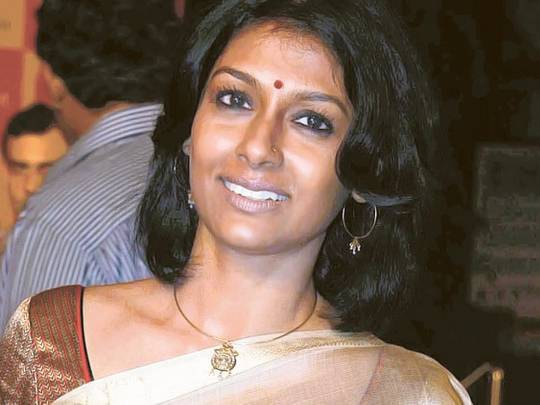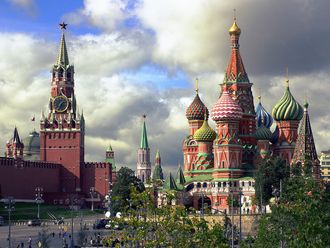
Mumbai: Looking to find a husband, make friends, and get ahead at work? Then you need to have lighter skin. That’s the all-pervasive message in India, and it’s something that one actress is fighting to overturn.
The new poster girl of the “Dark is Beautiful” campaign, Nandita Das, has called out India’s obsession with fair skin — a prejudice she says has driven some young women to the brink of suicide.
“Magazines, TV, cinema — everywhere being fair is synonymous with being beautiful,” Das said.
Described as having “dusky” skin as opposed to a fair complexion, the 43-year-old is well used to Indian preoccupations with colour, and not just in the film industry, where she has refused requests to lighten her skin for roles.
“How can you be so confident despite being so dark?” is a question regularly asked of Das, who has preferred to star in unconventional, issue-based films but says she would struggle to get ahead in mainstream Bollywood movies.
In May, Das became the face of the Dark is Beautiful campaign, launched in 2009 by activist group Women of Worth to celebrate “beauty beyond colour”.
Her backing has helped to generate increasing debate in the media, but the response has underlined just how ingrained the preference is for fairer skin, which has long been associated with higher social classes and castes.
“I started getting tonnes of emails from young women pouring their heart out about how they were discriminated against. Some wanted to commit suicide because they couldn’t be fair,” she said.
Das found her own photograph had been lightened by a newspaper even for a feature on the campaign. When looking for a nanny, she was told one candidate was “good, but quite dark”.
Amid such pressures to be pale, India’s whitening cream market swelled from $397 million (Dh1.45 billion) in 2008 to $638 million over four years, according to market researchers at Euromonitor International.
Skin-lightening products accounted for 84 per cent of the country’s facial moisturiser market last year, their report shows. The bias facing darker-skinned women was raised again in September when an Indian-origin woman, Nina Davuluri, won the “Miss America” contest in the United States.
“Had she been in India, far from entering a beauty contest, it is more likely that Ms Davuluri would have grown up hearing mostly disparaging remarks about the colour of her skin,” said an editorial in The Hindu newspaper.
“She would have been — going by the storyline of most ‘fairness’ cream advertisements — a person with low self-esteem and few friends.”
Last year, a commercial for an “intimate wash” to whiten vaginas emerged, showing a young Indian woman who uses the product to successfully regain her boyfriend’s attention.
The advert was widely panned, but a glance through matrimonial websites and newspaper columns suggests that fair skin, at least on a woman’s face, remains key to attaining an Indian husband.
Aspiring grooms often state in their adverts their preference for a fair bride, while nearly all women’s profiles describe their complexion as fair or so-called “wheatish”.
Ekta Ghosh, a fashion designer in Mumbai who specialises in wedding wear, said the message that only fair is beautiful had been passed down to Indian girls for generations.
“Parents, relatives, they all keep saying you should do something to lighten your skin tone,” she said.
India’s mass market whitening pioneer was “Fair & Lovely”, launched in 1975 by Hindustan Unilever and now selling in a range of other countries where pale skin is desirable, across Africa and the Middle East as well as Asia.
Indian consumer group Emami later came up with “Fair and Teen” for girls and “Fair and Handsome” for men.
Promoted by Bollywood superstar Shah Rukh Khan, the latest advert shows him tossing a tube of the cream from the red carpet to a young male fan.
Dark is Beautiful has launched a petition against the “irresponsible” video and its message that “fair skin is a prerequisite for success”.
So far more than 15,000 people have signed up in protest, but Khan has not responded.
“You’re telling people they’re just not good enough,” said Das, who describes whitening cream adverts in general as “so regressive and derogatory”.
Fairness cream producers suggest they help to boost users’ confidence, although both Emami and Hindustan Unilever declined to comment for this article.
Not everyone, however, is convinced such creams are even effective. Receptionist Prachi Chawan, 28, said she had been using Fair & Lovely products for three years “out of habit”, but has yet to see noticeable results.
“There have been no side effects but no change either,” she said.
Das believes whitening cream developers did not create Indians’ colour bias and insecurities, but have “cashed in” on it, creating a “vicious circle”.
While men’s fairness products are gaining ground, the actress says women and girls still face far more pressure over their skin tone, which she puts down to a general lack of respect and inequality.
“Until we let women have the same space as men and treat them as human beings, all this will carry on.”












